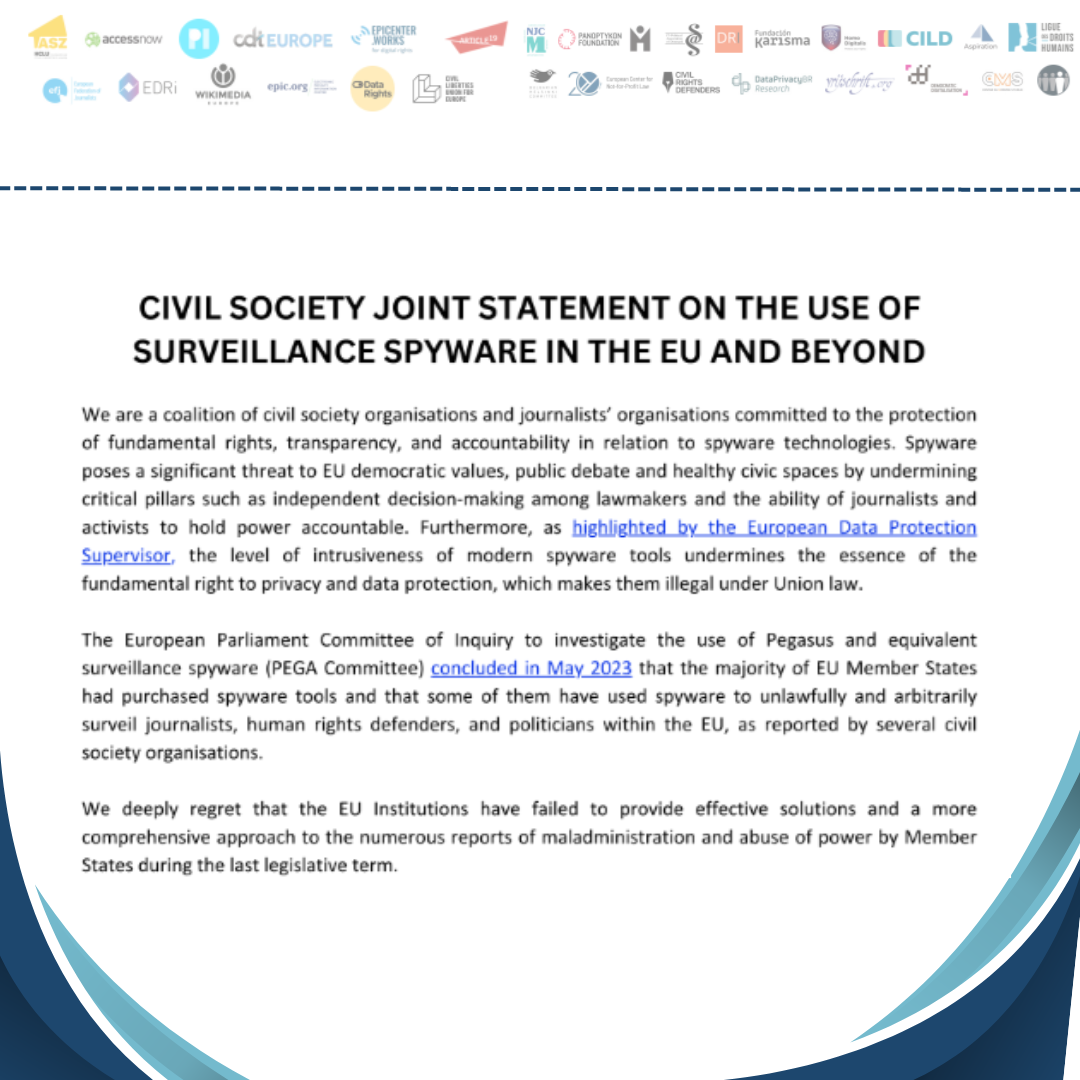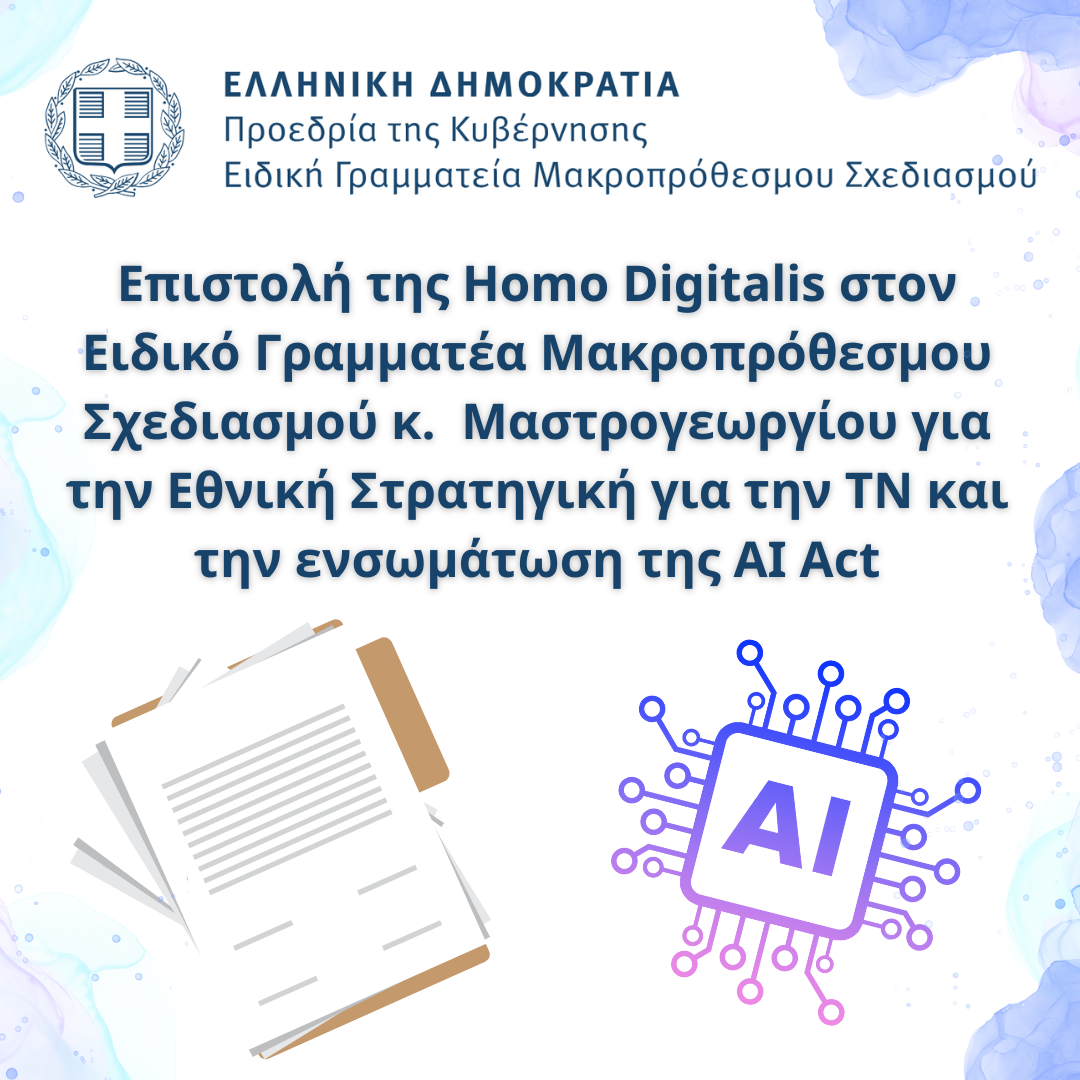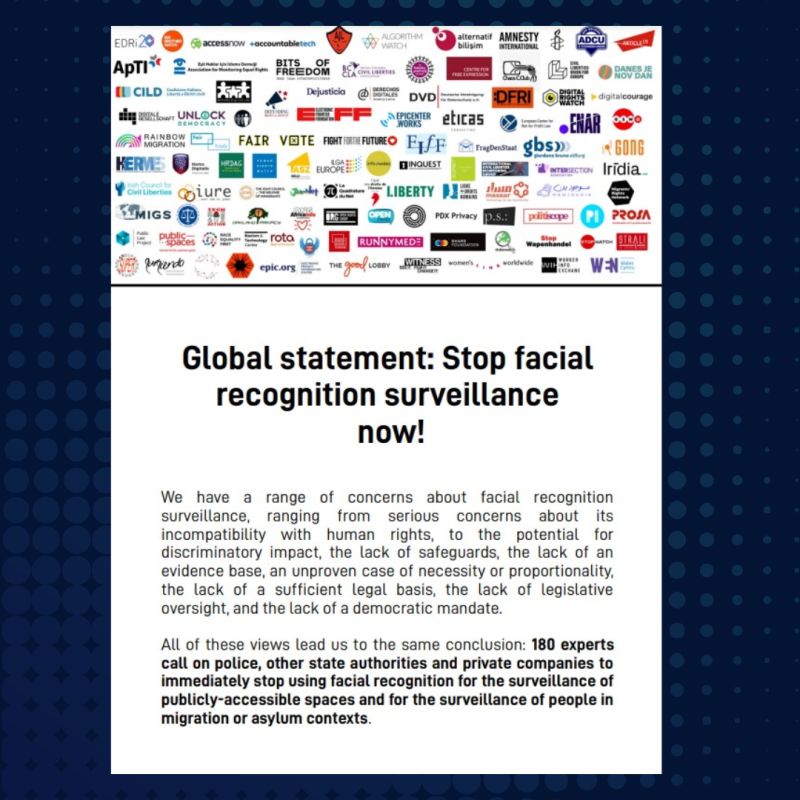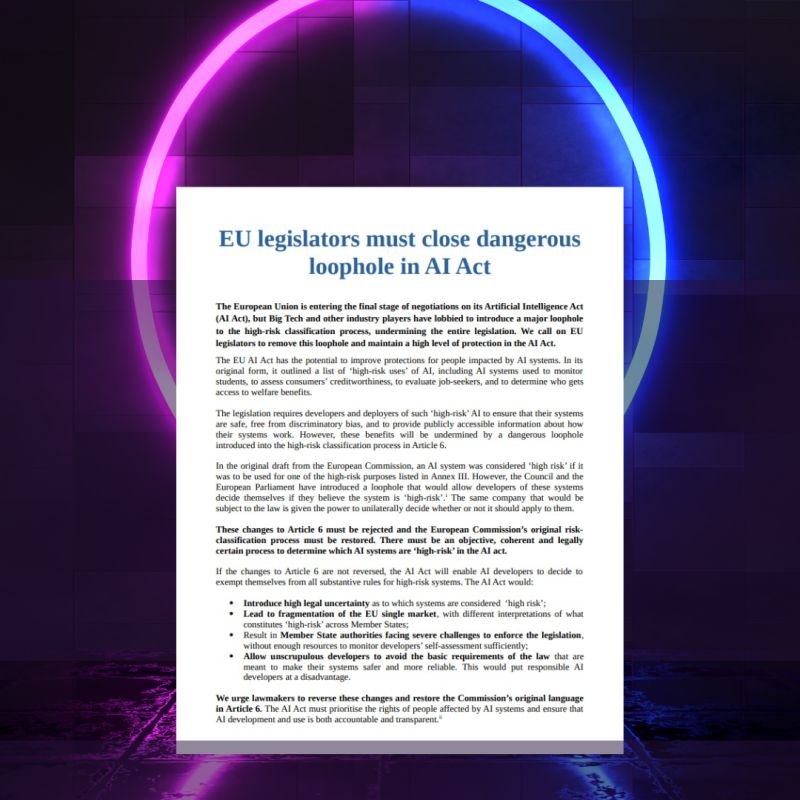Homo Digitalis participates in the European Commission's Open Consultation on General-Purpose AI
Yesterday, 18/9 Homo Digitalis submitted its responses to the European Commission’s Open Consultation under the title “FUTURE-PROOF AI ACT: TRUSTWORTHY GENERAL-PURPOSE AI”. The consultation covered issues concerning the future implementation of the AI ACT legislation and how to make the use of General-Purpose AI models trustworthy.
Homo Digitalis’ position paper on the Consultation was prepared by our organisation’s AI & Human Rights Director, Lamprini Gyftokosta and our member Tania Skrapaliori
You can read our statement here.
Civil Society Common Statement: United Against Spyware Abuse in the EU and Beyond
Spyware isn’t just a privacy issue — it’s a threat to the very foundations of our democratic values. By undermining independent decision-making, restricting public debate, and silencing journalists and activists, spyware erodes the pillars of a healthy civic space.
As new European Union institutions prepare to take office following the EU elections, the growing threat of spyware has become a pressing global concern that demands immediate attention.
On Tuesday 3/9, Homo Digitalis joined Center for Democracy and Technology Europe (CDT Europe), alongside 30 civil society and journalists' organisations in publishing a joint statement urging the incoming EU institutions to prioritise action against the misuse of spyware in the new legislative term.
Some of our coalition’s key recommendations include:
- A ban on the production, sale, and use of spyware that disproportionately harms fundamental rights.
- Stronger export controls to prevent the misuse of these technologies beyond the EU.
- Transparency and accountability in government contracts involving spyware.
As Silvia Lorenzo Perez, Director of CDT Europe’s Security, Surveillance & Human Rights Programme, puts it: "The incoming EU institutions have the opportunity to correct the failures of the last legislature by taking concrete and decisive action against the abuse of spyware surveillance."
The new EU institutions must seize this moment to restore public trust, protect our fundamental rights, and uphold the values that define the Union.
You can read the EN version of the letter here, and the EL version of the letter here.
Homo Digitalis has also addressed related concerns, before the Council of Europe’s Commissioner for Human Rights in a recent Open Letter submitted in August. You can read more about this here.
We submitted an Open Letter to the Special Secretary of Foresight Strategy about the National AI Strategy and the enforcement of the AI Act
Today, 1/8/2024, on the occasion of the entry into force of the AI Act, Homo Digitalis sent a letter to the Special Secretary of Foresight Strategy of the Hellenic Government, Mr. Giannis Mastrogiorgiou, regarding the National Strategy for AI and the incorporation of the AI Act into national law! In addition, we communicated our concerns to the Prime Minister’s Office and the Ministry of Digital Governance.
Among other things, we raise critical questions about the national governance and oversight model, the creation of regulatory sandboxes (No. 57) and how the Greek public will be informed when subjected to the use of AI systems that create profiles or make decisions about them in the provision of public services.
At Homo Digitalis, we believe that the next steps of the Greek government will be crucial for the effective or not defence of digital rights in Greece, at a time when AI is a reality in our daily lives. The proper incorporation of such a technical and legally complex legislation into national law and the solutions adopted to address the ethical and social issues that arise are crucial for all of us.
You can see the full text of our letter here.
We submitted our report to the UN Special Rapporteur on the right to education regarding the use of AI in education
The United Nations Special Rapporteur on the right to education, Ms Farida Shaheed is preparing her upcoming report for the UN General Assembly in October 2024 on the promotion of the right to education based on artificial intelligence tools.
Homo Digitalis, after completing a tour of schools and conversations with teachers, students and parents, believes that the contribution of civil society with a practical look at this issue is important!
For this reason we have submitted our report before her on Monday 27 May. We would like to thank Anastasios and Viliy Karagiorgou and Lamprini Gyftokosta for their important contribution to the drafting and filing of this report!
Our joint action on the Digital Euro & Right to Cash legislative initiatives
At the end of February, together with epicenter.works, European Digital Rights and other important civil society organisations, we sent a letter to the MEPs who are the rapporteurs and shadow rapporteurs of the DigitalEuro and Right To Cash packages.
Despite the fact that both proposed pieces of legislation are part of the same legislative package, we see that the relevant negotiations are moving at two different speeds!
With the European elections approaching and uncertainty prevailing regarding the proposed legislation on the Digital Euro and the challenges that arise with its technical features, we call on MEPs to separate these two legislative proposals in order to spend the necessary time to solve the problems that have been identified and highlighted by academics, and other experts in the field.
You can view our joint letter here.
We met with the Ministry of Digital Governance for the DSA and the AI Act
Today, Lambrini Gyftokosta and Konstantinos Kakavoulis represented Homo Digitalis in a meeting with representatives of the Ministry of Digital Governance.
The topic of discussion was the progress of the implementation of the Digital Services Act (DSA) in Greece, as well as the developments at EU level regarding the regulation of AI.
We would like to thank the representatives of the Ministry for the very fruitful dialogue! We continue to follow the developments and actively participate in their co-shaping.
We call on European legislators to ensure full consistency with the principles of the rule of law in the AI ACT
We continue the actions of co-shaping political decisions at European level for the proposed European regulation on Artificial Intelligence (AIAct)!
Together with the Civil Liberties Union for Europe, European Center for Not-for-Profit Law Stichting, European Civic Forum and 60 other CSOs, we call on EU-level legislators to ensure that the proposed provisions are fully consistent with the principles of the rule of law, including transparency, accountability and access to justice. You can read our joint letter here.
Action is also coming at national level!
We demand an end to the use of mass biometric surveillance technologies by law enforcement authorities in public places
Today, 120 civil society organisations and 60 academics, scientists and other experts on new technologies are joining forces to stop the use of mass biometric surveillance technologies by law enforcement authorities in public places.
It is a great honour for Homo Digitalis to be part of this initiative. Already since 2020 with European Digital Rights we have been involved in the #ReclaimYourFace campaign, in which more than 250,000 people across the EU signed our petition to ban these practices.
You can read the joint statement here.
We express our concerns about Article 6 of the proposed AI legislation
As the European Union enters the final stage of trilateral negotiations on the proposed AI legislation, more than 150 civil society organisations, including Homo Digitalis, are concerned about a major loophole regarding the classification process for high-risk systems in Article 6!
Big tech companies have managed to convince the European Parliament and the Council to adopt proposed provisions that essentially leave them to decide for themselves whether the system they develop should be considered “high-risk” or not!
Read our joint statement to learn more about the challenges involved here.








